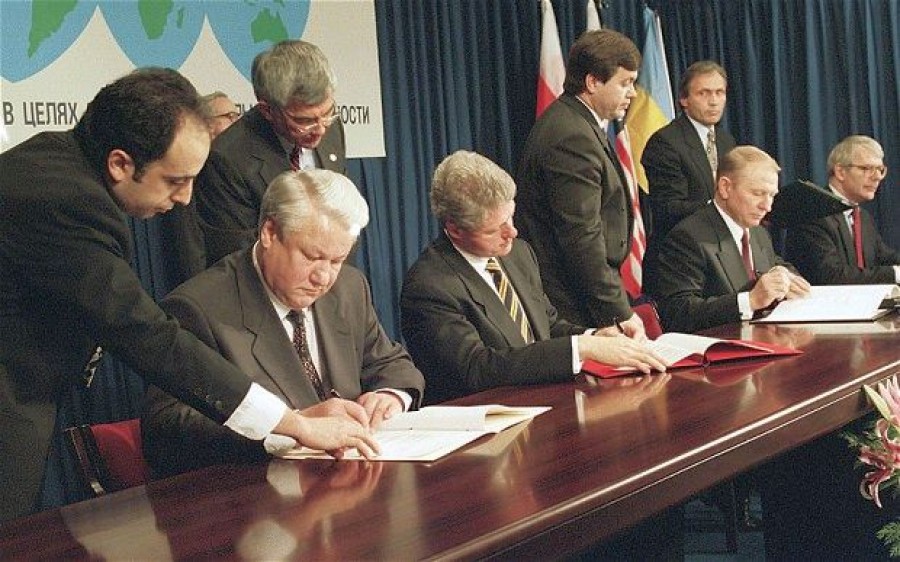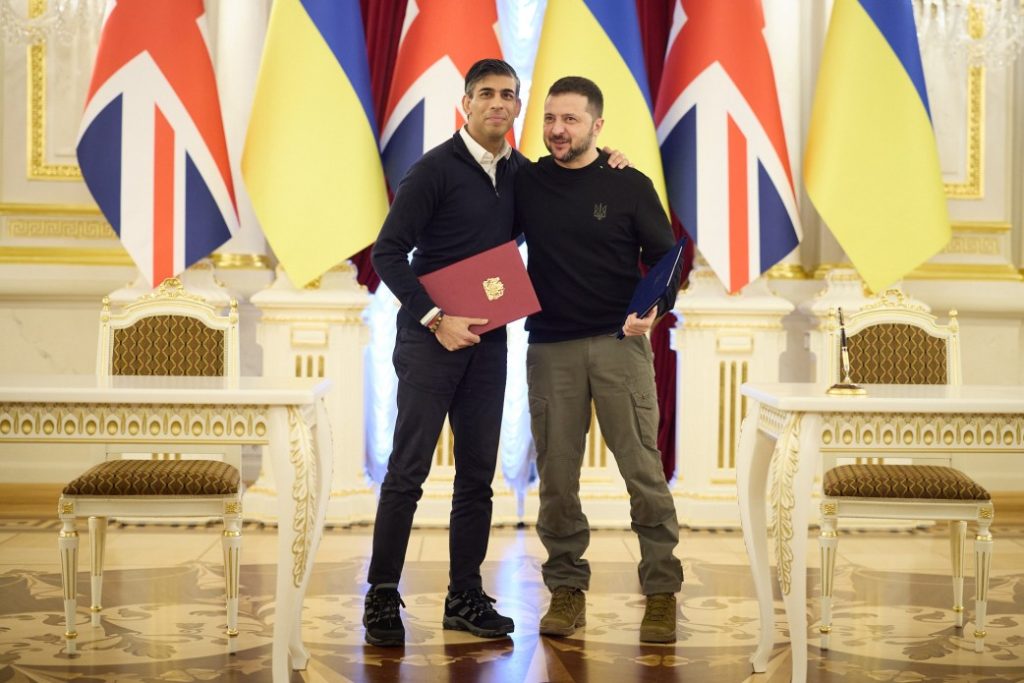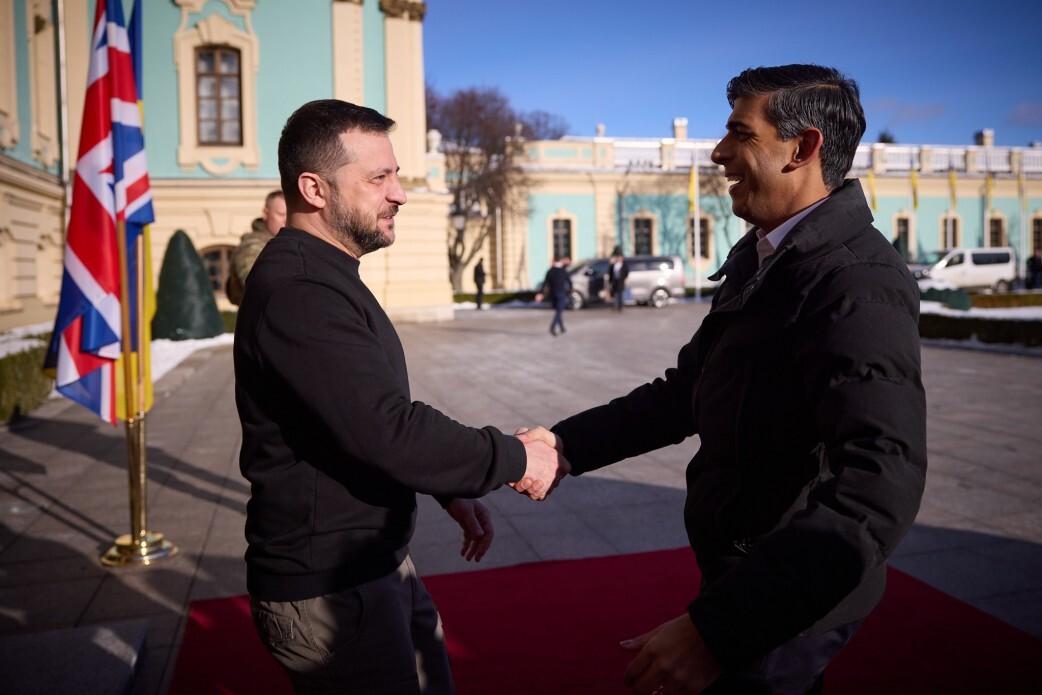On 12 January in Kyiv, Ukraine and the UK signed a bilateral agreement with great fanfare. It deals with military cooperation and some kind of security guarantees for Kyiv "if Russia attacks again." Urgent talks for similar deals with over a dozen other nations, including the US, Canada, and France, are underway.
Russia’s war in Ukraine is far from over, so some consider it premature to contemplate Kyiv’s future security arrangements. However, the Ukrainian government understands the threat Russia poses. It has renewed attempts to join NATO and the EU. In the interim, Kyiv also looks for security through other means.
However, Ukraine has a painful experience with international security agreements - the 1994 Budapest Memorandum signed by Ukraine, Russia, the US, and the UK. Back then, Kyiv handed over all its nuclear weapons to Russia in exchange for Western security guarantees. The result? Russia attacked Ukraine, killed hundreds of thousands of Ukrainians, and occupied 20% of its territory, while the West says these were not "guarantees" but "assurances," or ignores the Budapest Memorandum altogether.

After everything that has happened, Ukrainians cannot blindly trust the words of Western politicians who assure us of their future commitment to Ukraine. Regarding the UK-Ukraine deal, the main concerns are:
- What if the UK-Ukraine deal is the same as the Budapest Memorandum?
- What if "bilateral security agreements" is not a path to NATO membership but a replacement for it?
- What if this is just a prelude to freezing the war on Russian terms, after which Moscow, having regrouped, would attack again in a few years?
Euromaidan Press placed these questions and many more before Ukrainian and Western experts.
What did Ukraine and the UK sign?
The G7 countries agreed at last summer's NATO summit in Vilnius that signing bilateral security agreements with Ukraine - instead of inviting Ukraine to join NATO - would be the way forward. Volodymyr Zelenskyy then stated that this is an interim step until Ukraine joins NATO.
A bilateral agreement between Ukraine and the UK was signed during British Prime Minister Rishi Sunak's visit to Kyiv. The document provides for security cooperation over the next 10 years. The only concrete commitment in this document is that the UK promises to provide £2.5 billion for Ukraine's defense in 2024. This includes the purchase of shells, long-range missiles, various drones, and training for Ukrainian troops. As for the remaining 9 years, there is nothing specific.

The agreement also stipulates that the UK will provide “swift and sustained” security assistance if Russia attacks Ukraine again. The deal states that it is valid until Ukraine's accession to NATO, tied to Kyiv's implementation of a number of reforms. The treaty does not require ratification.
Volodymyr Zelenskyy and Rishi Sunak did use provocative terms like "security guarantees" and "security assurances" in their official speeches (provocative because the same words were used in the Budapest Memorandum). However, neither of these terms appears in the text of the security agreement itself. There are only "security commitments." Whether this changes the essence is for lawyers to judge.
The term "shall," common in legally binding documents, is also absent. Instead, there are the terms "would" and "will."
Is the UK-Ukraine security agreement a Budapest memorandum 2.0?
James Sherr, a Senior Fellow of the International Centre for Defence and Security in Tallinn, believes the security agreement between Ukraine and the UK has nothing in common with the Budapest Memorandum. The new deal is bilateral, not multilateral, and contains legal undertakings.
First, Britain is to provide Ukraine with significant defense assistance over a 10-year period, beginning this year with EUR2.7 billion, which is a considerable expense for the UK.
Second, the agreement contains firm commitments that following the conclusion of this war, whenever that may be, the UK will provide rapid and substantial military assistance in response to any future Russian aggression.
“It's like comparing Sweden with grapefruit, it doesn't mean anything. There are very specific undertakings there which have a legal character. And so that is something substantially different. Also, there are a variety of provisions which are not published. Because even today, the UK is doing a number of things in support of Ukraine, militarily, which we don't wish to publish,” Sherr explained to Euromaidan Press.
It is also important that the major political parties in Britain are consistent regarding support for Ukraine, unlike in the US.
James Rogers, a British analyst and co-founder of the Council on Geostrategy, says the Budapest Memorandum was not a meaningful security guarantee. It was a “negative” assurance: the UK, US, and Russia merely pledged not to violate Ukrainian territory. Obviously, Russia tore up the agreement in 2014. There was no mechanism for Ukraine to request assistance from the parties, one of which violated the pact.
“The Security Treaty the UK and Ukraine signed last week is a positive assurance. It contains an explicit consultation mechanism Ukraine can invoke if Russia launches a fresh offensive. So these assurances are better than the Budapest Memorandum, but they would not deter to the same extent as a UK or NATO security guarantee,” Rogers told Euromaidan Press.
On the contrary, Omar Ashour, a security and military studies professor at the Doha Institute, believes the agreement indeed resembles Budapest Memorandum version 2.0. However, he argues that the new pacts will likely have real substance since the West cannot allow history to repeat itself.
“You took away the nukes of Ukraine, the main weapon that could defend Ukraine, and you gave them assurances worth nothing. If you sign something like that and then behave that way, your reputation is gone. It was an insult for the UK, US, France, and China as observers too,” Ashour told Euromaidan Press.
Is the UK-Ukraine agreement a NATO substitute for Ukraine?
James Sherr believes that the signed deal and future ones are not a substitute for NATO membership for Ukraine at least because the word “NATO” is mentioned in the document 17 times.
“The UK not only stated it supports NATO membership for Ukraine, it states the UK that promoting Ukraine's membership of NATO is a fundamental British foreign policy commitment. So, the agreement is meant to advance Ukraine's integration and membership of NATO. It's clearly stated it's not an alternative” believes Sherr.
Oleksandr Kraiev, Director of the North America Program at the Foreign Policy Council “Ukrainian Prism,” believes that the signed deal and future ones pave the way for a 2024 NATO summit in Washington, where Ukraine is poised to receive an invitation.
"If the G7 tells Ukraine that for this Russian aggression, we respond by supplying weapons, and for the next one we'll also stand with you, plus you'll join NATO, it means an invitation is coming at the Washington summit. Otherwise, it's a total Western failure. Not inviting Ukraine into NATO means the US signaling it won't defend Taiwan either," Kraiev told Euromaidan Press.
He argues admitting Ukraine costs NATO nothing but offers many symbolic rewards. However, accession would only follow the war's conclusion in the sense that Russia's military loses its offensive capability.
"It's about Article 5. Not because the West fears fighting but because they'll start hesitating. Why is Article 5 intimidating? Because it means immediate action - F-35s bombing the Kremlin, British special forces raiding the waterfront, warships moving in. At least that's how Russians and Ukrainians envision it. The moment Article 5 must apply, NATO may crumble," believes Kraiev.
Omar Ashour contends the security deal with the UK is separate from Ukraine's potential NATO accession. The analyst believes Ukraine's NATO membership hinges on battlefield results, although he recognizes those results, in turn, depend on the scope of Western support. Still, Ashour argues that Ukraine joining the alliance would be justified militarily and politically.
“There's a famous military saying: ‘The only real security guarantees are the two Ns: nukes and NATO.’ They took Ukraine’s nukes. They had better give Ukraine the other N and let it join NATO,” believes Ashour.
In analyst’s view, Ukraine could significantly strengthen NATO since the so-called “eastern flank” is actually now its central theater.
“If Russia gains control of Ukraine, then the Baltics and Poland will be next. Ukraine is the largest country in Eastern Europe, with the most experienced army now. So Ukraine provides a major strategic contribution,” said Ashour.
Does the deal imply acceptance of a frozen war?
The agreement has nothing to do with an alleged freezing of the war, believes James Sherr. Whether the war freezes on Russia's terms or not does not depend on what's written in this pact.
“Sunak has said the war will have to end in negotiation as all wars do. But he didn't say that in connection with this agreement. There's no mention of that in this agreement. He meant that the negotiations would start and be concluded to Ukraine's advantage. The UK, at least under his government, is not going to consider negotiations on another basis,” said the analyst.
However, Oleksandr Kraiev sees links between the security pact and a potential war freeze in Ukraine. However, he says, no world leader has raised peace talks yet.
"It would make sense to use the guarantees either to bolster a Washington summit invitation or facilitate a freeze. Like, we gave you assurances, now let's end this phase so guarantees apply for the next round. There's a clear correlation. But is it causation? That's the question," said the expert.
Painting an even bleaker picture, Ukrainian military expert and retired Colonel Roman Svitan believes the section of the Ukraine-UK deal devoted to "future Russian aggression" undermines an otherwise good pact on defense cooperation.
"What does 'future Russian aggression' mean? Is it after today's attacks, starting tomorrow morning? Will it happen after Ukraine beats Russia and gets back the 1991 borders? Or does it mean freezing the fighting and dividing the land so Ukraine gives up some of its territory?" Svitan told Fabryka.news.
Will the UK-Ukraine deal set a new security standard for Europe?
This agreement sets a high standard for other European NATO allies and pushes things forward for Ukraine, says James Sherr. The more robust bilateral deals that follow, especially with major powers, the more pressure mounts on the US and NATO to strengthen their own security commitments to Ukraine.
“Other European countries that conclude bilateral agreements with Ukraine will need to do something very similar, or they will be asked: why are you doing less than the UK? That would not be a comfortable question in Britain, Germany, or France,” believes the analyst.
On the contrary, former Ukrainian Ambassador to the EU Kostiantyn Yelisieiev thinks that beyond the victorious political rhetoric, the document has become a record of the maximum level of support that influential international players are willing to provide Ukraine. It is unlikely any other Western partners would be willing to strengthen the agreement.
"Unfortunately, the agreement has created a dangerous precedent, whereby other partners will follow the logic of this document. The widely touted promises that Ukraine would be given security guarantees turned out to be a myth," Yelisieiev told the New Voice.
Is the UK taking the lead on Ukraine security?
Foreign policy expert Serhiy Solodkyi of Ukraine's New Europe Center believes the new UK deal, while not providing rigid security guarantees for Ukraine, should be a step toward obtaining them. Beyond NATO, there are several other formats for such guarantees globally, but all require US involvement - as seen with Israel, Taiwan, and South Korea. However, none of these countries secured agreements instantly.
“No security model works without the US – that is a crucial component. And no country we analyzed obtained security guarantees right away. No, politicians and diplomats in these nations demanded and fought to get them. Early proposals were much weaker,” Solodkyi explained to Euromaidan Press.
James Sherr highlights another critical aspect of this deal: it clearly states the UK's aim is to support Ukraine's armed forces in restoring all of Ukraine's internationally recognized territory, including maritime zones, if attacked.
“The Biden administration has never said US support for Ukraine is to enable it to recover all its legally internationally recognized territory. The UK has now explicitly stated this and put it in an agreement,” said Sherr.
However, the key question is: what are the West's objectives in this war? Simply "supporting Ukraine as long as it takes" is not an objective - it's an advertising slogan that means nothing.
“Even if the US said: ‘We want to expel Russia to the borders of 23 February 2022,’ that would be something. Some would say that's insufficient, but at least it's an objective that would put us in a more constructive frame of mind than today. Because currently, the US policy is designed to create a nice warm feeling, but it is confused and confusing,” said the expert.
If the objective is for Ukraine to prevail militarily, the West must not only continue current support but do considerably more. This does not necessarily mean NATO forces intervene directly, but it does require increased assistance done differently, Sherr believes.
More than Budapest, less than desired
In summary, the bilateral security pact between Ukraine and the UK represents meaningful progress in itself. As many experts note, the deal's legal undertakings exceed the worthless assurances of the Budapest Memorandum.
However, the agreement does not exist in a vacuum. The timing and specifics prompt difficult questions about the West's long-term intentions amid a still-raging war. While the UK deal sets positive precedents, uncertainty lingers around how much support Ukraine can truly count on over the long haul.
For Ukraine, past betrayals caution against fully trusting external pledges, no matter how forcefully declared. Until realizing NATO accession or equally ironclad guarantees, Kyiv cannot rely on outside security arrangements alone - maintaining national defense readiness remains imperative. So, while representing progress, the UK deal alone provides no definitive assurances. Its ultimate significance will be defined by what commitments and actions from the West follow next.
Read more:
- Zelenskyy and Sunak sign landmark security pact between UK and Ukraine
- Ukraine's nuclear disarmament was after all a blunder, new docs show
- The specter of Budapest Memorandum hangs over Ukrainian negotiations, darkens the future of global security
- Only restoring Ukraine's nuclear status can be an alternative to its NATO membership - Estonia's Foreign Minister

